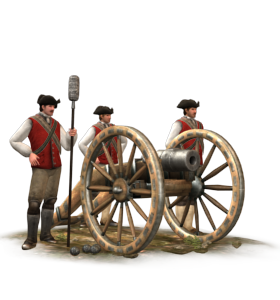Difference between revisions of "12-lber Howitzer Foot Artillery (ETW Unit)"
Shackleton (talk | contribs) |
Shackleton (talk | contribs) |
||
| Line 2: | Line 2: | ||
|Class=Artillery | |Class=Artillery | ||
|Unit Size=24 men | |Unit Size=24 men | ||
| − | |Weaponry=12 pdr | + | |Weaponry=12 pdr howitzer |
|Region=Global | |Region=Global | ||
|Recruitment Cost=630 | |Recruitment Cost=630 | ||
Revision as of 12:06, 6 January 2013
 Howitzers send shells plunging into enemy formations and over defences, making cover irrelevent.
Howitzers send shells plunging into enemy formations and over defences, making cover irrelevent.
Overview
Howitzers fall somewhere between guns and mortars, the other main artillery types. They have a limited mobility, like guns. Like mortars, they do not fire straight at the target, but send shots high into the air to plunge down on a target (and over anything in the way). By angling the barrel and changing the propellant charge used, howitzers have an impressive flexibility in shell trajectories. Experienced crews can lob explosive shells and incendiary rounds with great accuracy into a “beaten zone”, making life utterly miserable and very short for anyone within it. In close action, they can fire canister rounds directly into enemy formations, like giant sawed-off shotguns.
The term foot artillery applies because the gunners walk into battle alongside the draft animals. Like all artillery, the rating of these howitzers refers to the nominal weight of shot fired; loading the heavier pieces made for strong gunners!
Historically, howitzers – like many other artillery pieces – were far from standardized weapons in the 18th Century. Shells and spare parts made in one foundry did not always fit another foundry’s pieces, even if the caliber was nominally identical and the two guns were part of the same battery in the field. It took a good deal of effort and argument to get foundries to standardize barrels and ancillary equipment, even in a single country.
Details
Howitzers are very different from cannons. They fire in arced trajectories, meaning that hilly terrain and walls that would often humbug regular cannons pose little problem to howitzers. However, this same characteristic means that cannnons are more suitable for close and direct engagements, where canister shot can be brought to bear. Thanks to their arc trajectories, howitzers are very accurate at long range compared to other cannons. Howitzers also fire an array of different ammunition: explosive shells, which are more effective than round shot for anti-personnel use, carcass shot, which is accurate but causes minimal damage to most enemy troop types, quicklime, and percussive shells.
Factions
 Great Britain
Great Britain United Provinces
United Provinces Austria
Austria Bavaria
Bavaria Dagestan
Dagestan Gran Colombia
Gran Colombia Courland
Courland Denmark
Denmark France
France Genoa
Genoa Georgia
Georgia Greece
Greece Hannover
Hannover Hessen
Hessen Hungary
Hungary Ireland
Ireland Knights of St. John
Knights of St. John Louisiana
Louisiana Mexico
Mexico Naples & Sicily
Naples & Sicily New Spain
New Spain Norway
Norway Italian States
Italian States Savoy
Savoy Poland-Lithuania
Poland-Lithuania Portugal
Portugal Prussia
Prussia Quebec
Quebec Russia
Russia Saxony
Saxony Scotland
Scotland Spain
Spain Sweden
Sweden Thirteen Colonies
Thirteen Colonies United States
United States Venice
Venice Westphalia
Westphalia Württemberg
Württemberg
